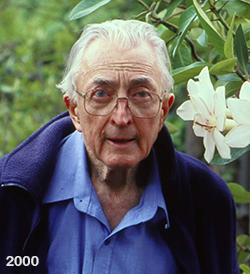
Council of Heads of Australasian Herbaria
Australian National Herbarium
Biographical Notes
 |
Council of Heads of Australasian Herbaria |
 Rouse, John Layton (1925 - 2002)
Rouse, John Layton (1925 - 2002)John was born on 21 April 1925 and grew up in Melbourne; he died on 13 March 2002.
He left school in 1943 and joined the Royal Australian Air Force where he was given training in the early radar technology of the time and, at the age of 18, was posted to a radar unit in north Queensland.
There, in his spare time, John completed the three years of a university mathematics degree so that upon discharge at the end of the war he was able to rapidly obtain his Honours degree. His strong interest in physical matters led him to complete a Master of Science degree in 1952.
Physics then dominated his academic work, and John took the lead in the team that designed and built the world's first Variable Energy Cyclotron. His degree of Doctor of Philosophy was awarded in 1957 and he then joined the permanent staff of the Physics School of the University of Melbourne. He remained in physics until his retirement.
John followed his father in becoming a trustee of the Baker Foundation, a philanthropic foundation that gives significant support to medical research at the University of Melbourne. He was influential in having the Baker Foundation broaden its scope into other biological areas and the Foundation is now a primary supporter of the Australian Research Centre for Urban Ecology, a centre that John played a key role in establishing.
His expertise in horticulture and science fitted him well for becoming a trustee of the Maud Gibson Gardens Trust, a trust which supports activities at the Royal Botanic Gardens, Melbourne.
In the 1960s John developed a particular interest in the genus Rhododendron and he became a specialist in sect. Vireya species, which thrived in his Toorak garden.
He kept meticulous records of the numerous experiments that he conducted into seed germination, potting media, hybridisation, grafting compatibility, and so on.
John was the sole or co-author of over seventy articles involving rhododendrons, over thirty of which are meritorious for their impact in their respective disciplines, mainly in the field of reproductive biology but ranging from grafting and seed raising studies to phyllotaxis.
Towards the end of his life, John was suffering from two serious conditions, Parkinson's disease and myelodysplasia, both of which he managed with courage and good humour. He died on 13 March 2002 after being in hospital for about a week.
John's Order of Australia award was made in recognition of his contribution to horticulture.
Source: Extracted from:
https://scholar.lib.vt.edu/ejournals/JARS/v56n3/v56n3-craven.htm
In Memoriam: John Layton Rouse, by Lyn Craven.
Portrait Photo: 2000, photo: Lyn Craven (ANBG Photo Collection).